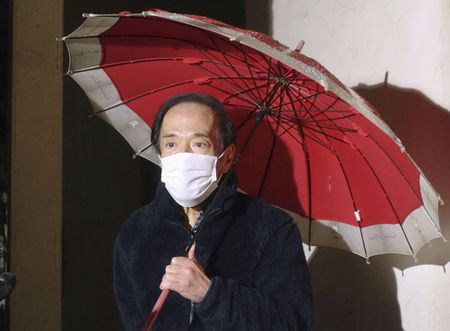By Leika Kihara
TOKYO (Reuters) – Japan’s government is expected to name academic Kazuo Ueda as its pick to become next central bank governor, a surprise choice that could heighten the chance of an end to its unpopular yield control policy.
Ueda, a 71-year-old former Bank of Japan (BOJ) policy board member, is set to succeed incumbent Haruhiko Kuroda, whose second, five-year term ends on April 8.
The government is also set to nominate Ryozo Himino, former head of Japan’s banking watchdog, and BOJ executive Shinichi Uchida as deputy governors. They will succeed incumbents Masayoshi Amamiya and Masazumi Wakatabe, whose terms end on March 19.
Below are key dates to watch:
WHAT’S NEXT?
The government will present the nominees to a parliament committee meeting on Tuesday.
The governor and deputy governor nominees will testify at confirmation hearings to be held on Feb. 24 for the lower house, and Feb. 27 for the upper chamber, sources have told Reuters.
The parliament will then vote on the government’s nomination, which is most likely to be approved as the ruling coalition holds a majority in both houses of parliament.
BOJ RATE-SETTING MEETINGS
The final policy-setting meeting for Kuroda and his two deputies will be held on March 9-10.
Ueda will chair his first policy meeting on April 27-28. At the April meeting, the BOJ will issue for the first time its quarterly growth and inflation projections for fiscal 2025, which will offer clues on how quickly the central bank could move toward an exit from ultra-easy policy.
By the time the BOJ holds its April meeting, big firms would have agreed with unions on next year’s annual pay in “shunto” spring wage negotiations.
OTHER KEY EVENTS
Japan’s economic and inflation data will remain in the spotlight as the BOJ gauges the timing of an interest rate hike.
Core consumer inflation hit 4.0% in December, double the BOJ’s price target, as companies hike prices to pass on higher raw material costs to households. Analysts expect it to stay above the BOJ’s 2% target for several more months, before slowing due to recent declines in global commodity costs.
Consumer inflation data for February is due out on March 18.
In a positive sign for policymakers, data due out on Feb. 14 will likely show Japan’s economy returned to growth in the last quarter of 2022 as consumption made a delayed recovery from the COVID-19 pandemic.
The new BOJ governor will be busy with international meetings. The first major one involving travel will likely to be the spring International Monetary Fund (IMF) meetings to be held in Washington D.C. on April 10-16.
Japan will also chair this year’s Group of Seven (G7) meeting of advanced economies, where inflation and monetary policy will likely be among key topics of debate.
(Reporting by Leika Kihara; Editing by Sam Holmes and Lisa Shumaker)


